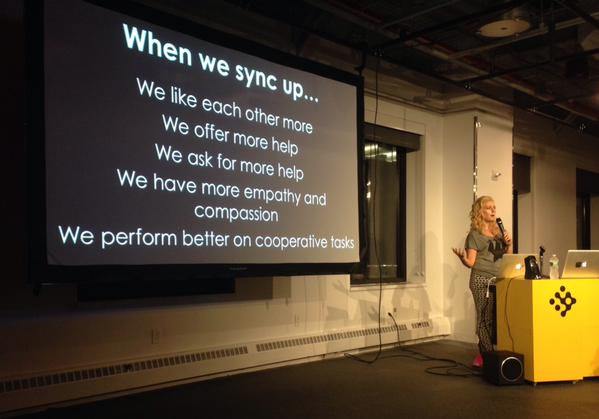Jane McGonigal wants you to be a “super-empowered hopeful individual,” and she wants you to do it by playing games.
McGonigal, a New York Times best-selling author and renowned expert on the cognitive benefits of video games, spoke to more than 200 NYU students Wednesday night about tapping into a gameful mindset in everyday life, overcoming depression with the help of games and a “massively multiplayer word game.”
“[Gaming] is literally the opposite of depression,” McGonigal said. “How can we bring the opposite of depression to everyday life?”
McGonigal cited research from Stanford University that showed games’ effects on the brain from the view of an MRI. The most telling activity was in the hippocampus, the part of the brain associated with learning.
Your brain on games. @avantgame @NYUGameCenter #Superbetter (thanks to @Stanford for FMRI imagery) pic.twitter.com/DVWafJV6Xh
— Games for Change (@G4C) September 16, 2015
It’s a common phrase that “the brain is like a muscle” that gets stronger with exercise, and McGonigal emphasized that playing a game for the first time “really gets your hippocampus up and running.”
Aside from strengthening your brain’s learning muscle, McGonigal demonstrated some of gaming’s other benefits with the help of the audience.
A Game in the Middle of a Game Discussion
In the middle of the talk, McGonigal called everyone’s attention to a single Scrabble piece that had been set on every chair in the room. Then, it was game time.
The researcher laid out the rules of the game, which she dubbed a type of massively multiplayer word game: The room had 60 seconds to band together and create words with their Scrabble pieces.
When the horn sounded to start the game, students jumped from their chairs and immediately started to collaborate. People were scurrying across the room to find someone with the final letter of their prospective word, and the energy was palpable.
https://twitter.com/aburak/status/644292688846696448
McGonigal led three variations of the game, which seemingly created more energy each time. By the third game, the room was raucous with groups shouting out their words and imploring people to work together.
The demonstration worked, and it was a clear example of McGonigal’s overarching message.
Games can be beneficial to mental health because people love a challenge, and they’re more likely to collaborate when faced with a challenge.
She calls it the “gameful mindset,” and she suggests people look at the challenges they face in their daily lives as a type of problem they need to solve with strategy — just like a game.
A First-Hand Account of the Benefits of Gaming
McGonigal has been researching the cognitive effects of games for more than a decade, but she also shared a personal anecdote during the presentation that seemed to really strike a chord with the audience.
A few years ago, McGonigal suffered a concussion. When she was still experiencing post-concussion symptoms weeks later, she started to come to grips with the fact that she may never fully recover.
Understanding she has dedicated a large chunk of her life to designing games and researching their benefits, she tackled her problem the best way she knew how: She created a game.
While recovering from her concussion, McGonigal was having a difficult time watching and absorbing television shows and movies she had never seen before. She felt much more comfortable re-watching some of her old favorites, and that led her to “Buffy the Vampire Slayer.”
In honor of Buffy, she created “Jane the Concussion Slayer,” a game all about a brave character who was not afraid to conquer her troubles head on and solve her problems.
“Jane the Concussion Slayer” soon manifested itself into “SuperBetter,” based on McGonigal’s thought that, “I may never really fully recover from this concussion, but I can get superbetter by becoming a better person.”
SuperBetter is available online, on the App Store and on Google Play. It’s also the name of McGonigal’s second book, which is available on Amazon.
Six Superpowers
McGonigal went in-depth on the importance of post-traumatic growth in her recovery and the recovery of many others.
For many people, growth after a traumatic event causes them to rethink their priorities, become closer with friends and family, better understand themselves, create a new sense of purpose and achieve a greater sense of focus.
McGonigal credited those feelings with “six superpowers” people can use then they’re in the gameful mindset.
- The challenge mindset: Being willing to rise to the occasion and engage a challenge
- High vagal tone: Being resilient and having positive reactions to stress
- Connectedness: Having a strong sense of social support
- Committed action: Doing at least one thing everyday that supports your goals
- Psychological flexibility: Not being afraid of negative feelings
- Positive reappraisal: Having the ability to identify benefits or opportunity
McGonigal closed the talk by asking the audience to look at their Scrabble piece one more time and associate that letter with someone in their life. She challenged them to reach out to that person and do something for them.
Whether it was thank them, apologize to them, or make them feel appreciated, McGonigal urged the audience to create their sense of social support soon by taking the first step toward helping someone else.
And even better: They could make a game out of it.
Thank you, @avantgame and @NYUGameCenter for a really great event! And to everyone who attended! What a turnout 🙂 pic.twitter.com/ruXTNMdI2F
— Games for Change (@G4C) September 17, 2015
Before you go...
Please consider supporting Technical.ly to keep our independent journalism strong. Unlike most business-focused media outlets, we don’t have a paywall. Instead, we count on your personal and organizational support.
Join our growing Slack community
Join 5,000 tech professionals and entrepreneurs in our community Slack today!
